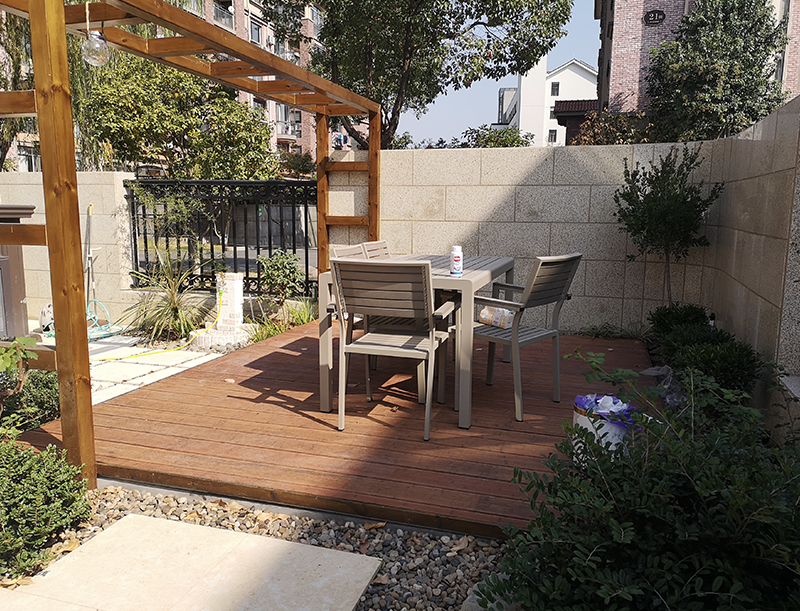After a period of use, how about the appearance of common outdoor floor materials on the market? Let's look at four common materials:
1. Natural antiseptic wood
Some natural wood is called natural preservative wood, because the extract contained in the core material has a certain degree of anti-corrosion ant resistance, which can be indirectly used outdoors. They are usually represented as Eastern Redwood pineapple grids.
Natural antiseptic wood has been treated with any chemical treatment. Although the durability is better than that of ordinary wood, the extract of core wood as preservative will decrease with the change of environment time, there is no durability in general. Although the eastern red cypress can be antiseptic, the effect of ant control is relatively small. Pineapple crystal lattice is easy to crack deform, will gradually decay after about 5 years.
2. Wood plastic floor
Some people like wood plastic floor think it has better durability. In fact, otherwise, as the name implies, wood plastic is transformed plastic (greater than PE) wood powder bamboo powder by road mixing, granulation extrusion, which can be regarded as plastic, rather than adhesive "fiberboard".
Because of the addition of plastic, so the plastic is hydrophobic material, so it has a certain humidity resistance. At the same time, under the influence of plastic brittleness relatively low thermal expansion coefficient, the wood plastic floor will be deformed cracked, its volume will remain stable. Problems such as gender differences, aging so on, usually lasting for one to two years.
3. Bamboo floor
After the reorganization, the bamboo floor is made by opening the bamboo material, grinding the green yellow bamboo into bamboo wire, carbonizing, wetting, dipping other specific processes, then forming high temperature high pressure glue.
After special treatment, the sugar, wax other components in bamboo are removed, so that the bamboo floor has certain insect prevention function, but the hardness after bonding is low, the foot feeling is spacious, the site cutting construction is very convenient. The common bamboo floor is used outdoors, it is easy to degumme after 1-2 years.
4. CCA antiseptic wood
Due to the limitations of natural antiseptic wood, CCA antiseptic wood is gradually used, which is commonly used in the Chinese market.
The main component of CCA preservative is chromium copper arsenate. The treated wood surface is light green. Arsenic chromium in CCA may be harmful to human, animal surrounding soil environment, increase the risk of cancer. As a result, the United States, Japan, Europe other countries / regions have stopped using CCA treated wood in inaccessible places.
Although CCA anticorrosive wood has potential safety hazards, it does have anticorrosive properties. Therefore, CCA treated preservative wood is still used in China. However, anticorrosive wood for home use usually has the phenomenon of "never anticorrosive". Why?
In order to reduce the cost of production, use the chemicals whose concentration does meet the standard. The wood is never pressurized, so only immersion surface brushing are required to obtain a sufficient depth of anti-corrosion treatment. After wind, day rain, the preservative will disappear gradually, the wood will no longer have anticorrosive function, so the anticorrosive time is longer, the problems of deformation cracking are relatively small.
Solid wood floor is carbonized in high temperature depth, only need heating steam treatment, carbonization is even, no need to use any medicine, safety environmental protection, corrosion resistance, durable.
However, it is difficult for the factory to reach this level of technology. When the temperature is low, it will burn the temperature is useless. Therefore, this product is only imported.

0572-5682995
Dedicated to R & D manufacturing of outdoor heavy bamboo floor, wallboard, outdoor heavy bamboo decorative materials, outdoor heavy bamboo furniture stable board
Mobile: 13587942202 Miss Wang
Email: jessie@joolan.cn
Address: Xinshangtang village, hanglong Town, Anji County, Huzhou, Zhejiang